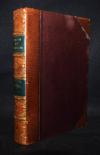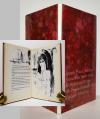James, My aunt Pontypool
James, My aunt Pontypool
|
(James, George Payne Rainsford). My aunt Pontypool. 3 Teile in 2 Bänden. Philadelphia, E. L. Carey & A. Hart 1836. 8°. 4, 207 S.; 206 S. Orig.-Halbleinenbände mit Rückenschildern. Erste amerikanische Ausgabe; die erste Ausgabe erschien 1835 in London bei Saunders and Otley. – „George Payne Rainsford James was born in Hanover Square in London on August 9, 1799. His father was an American Revolutionary war veteran and physician, and his mother died when he was a young child. At a young age, James learned several Eastern and Western languages, among them, Persian, French, Italian, and German, (although he failed to master Arabic). At age thirteen, however, he told his father he had decided not to obtain a university education and requested permission to join the navy, to which his father replied: „You may go into the army if you’d like; it’s the life of a dog, but the navy is a life of a damned dog, and you shan’t try it“ (Joline 8). Thus, James joined the army and was wounded in battle. After his release from the army, James had a series of encounters with prominent writers which helped launch his literary career. He had met Lord Byron as a boy, but it was his encounter with Washington Irving during his travels through Europe that encouraged James to write his first novel, Richelieu, in 1825. Published in 1829, Richelieu was publicly acclaimed, particularly by Sir Walter Scott, who after having read it „advised him to adopt literature as a profession“ (Joline 12). Only three years after finishing his first novel, he married Frances Thomas, a daughter of a physician, with whom he had two children. By 1830, James’s career had begun in earnest, averaging two to three novels per year, including works such as The String of Pearls (1832), The Gentleman of the Old School (1839), and Castleneau; or The Ancient Regime (1841). James’s career continued to expand and blossom when, during the final years of William IV’s reign, he was appointed Historiographer Royal. This post not only increased James’s professional career, leading him to write historical texts as well as novels, but it also widened his social sphere, giving him connections with members of the aristocracy such as the Duke of Wellington. Throughout the 1840s, he continued his prolific career, publishing dozens of novels, and no fewer than nine separate titles in 1847 alone. In 1850, James moved to the United States, settling at first in New York, then in Massachusetts, where he became active in the literary community, meeting Nathanial Hawthorne and Henry Wadsworth Longfellow. Soon after, in 1852, he was appointed the post as the British Consul, in Norfolk, Virginia. Gradually, his health deteriorated, and as a result, he requested to obtain the General Consul at Venice, in the hopes that the Mediterranean climate would improve his health. The request granted, James moved to Venice in 1858 where he published The Cavalier, his 91st and last publication. On June 9, 1860, James died of an apoplectic stroke in Venice, though the exact location of his interment is still disputed“ (Whitney Helms, University of Nebraska). Rücken aufgehellt und berieben, stellenweise teils stärker stockfleckig, gutes seitlich und unten unbeschnittenes Exemplar in den Original-Verlagseinbänden.
Unser Preis: EUR 200,-- |

|










